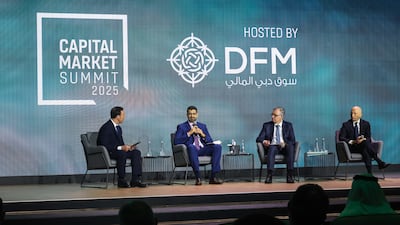US President Donald Trump’s latest tariff war is far more intense than the first one, but it will not be an easy win for the administration as US dollar assets are under pressure like never before and capital markets volatility could force Washington's hand in softening its stance, economists say.
While the tariff war is among the leading threats, the even bigger risk is extreme policy uncertainty in Washington. It has forced nations to seek new alliances and has opened trade and investments avenues for neutral countries such as the UAE, economists told the third Capital Market Summit in Dubai on Tuesday.
“During the first round of the [Trump] administration, one politician said trade wars are beautiful and easy to win [but] this time around for the US administration, it's not going to be easy to win this war,” Sergei Guriev, Dean at London Business School, said.
“Sometimes you hear noises from the White House that they will punish countries trading with China, they will punish countries helping avoid tariffs, [but] I don't think they have capacity for that.”
The world remains in very unsettled state with continued mercurial policymaking. However, the volatility in capital markets is a bit of a silver lining, as it is something that has forced Washington to walk back on some of its hardest policy positions.
“My optimistic angle is this administration seems to be sensitive to markets when it sees that people who are friends with administrations are losing money, when they see that capital markets, bond markets are nervous, they sometimes walk back,” said Mr Guriev, who was chief economist at European Bank for Reconstruction and Development at the time of the first Trump presidency, told the delegates.
Mr Trump won the US election in 2024 on a promise of improving the economy, including reducing the cost of living, and impose stricter immigration policies. He followed through his campaign promise of imposing tariffs on US trade partners and allies, and levied historic duties that are threatening to disrupt global trade and break out of a full-blown tariff war with China, the world’s second-biggest economy.

He has put 145 per cent tariff rate on goods going to the US from China, while Beijing has responded with a 84 per cent tariff rate. He also levied stiff duties on partners across the EU bloc and other Asia economies that have clouded prospects for global economic growth.
The uncertainty stemming from Washington’s insistence on upping the stake in tariffs sent capital markets on a white knuckle ride from US benchmark index crashing from all time highs into correction in a short span of time, losing more than $6 trillion in the first two days of the so-called liberation day announcement in April. Bonds and other US-dollar denominated assets have also felt selling pressure, which forced the US administration to suspend the record-high tariffs for 90 days and levied 10 per cent broad-based duty while it negotiates individual trade deals.
Markets still remain jittery and headline-driven and analysts say a clear heading of US dollar assets will not be determined until trade-related uncertainty is removed.
“Where I'm worried, I think, we'll see a lot of dollar volatility because this is something which we've never seen before,” Mr Guriev said.
“During volatile periods, people would usually flock into safe assets [but] the US dollar this time around, nobody's sure how safe US dollar assets are … this is something to think about, when you're a financial investor that how you hedge the US vulnerability?”
While nations around the world have taken different approaches to deal with US tariffs, countries in the Middle East such as the UAE have maintained a “more patient engagement” as it underpins its focus on its geographic advantage in trade and is charting policies to match it, Rajeev Sibal, senior global economist at Morgan Stanley, said.
Dean at London Business School
“The Cepa [deals] that the UAE is negotiating have really opened a pathway,” he said. “So, I think what's going to happen … you're going to see new trade channels being formed, and it's really going to be about recognising where the opportunity is, and if policy can help effectuate that change and here's the place that I think it is happening.”
The UAE, the Arab world’s second-largest economy and Dubai in particular has faced many similar cyclical headwinds in the past but the Emirates over the past five years has instituted structural changes that mean it is well-placed for growth despite external shocks, Simon Williams, chief economist CEEMEA, HSBC Middle East, said.
Mr William and Mr Guriev said and neutral countries should continue to trade with everybody and it's a good idea to attract investments from both east and west, and benefit from that.
“I think if we converge on the structure of tariffs that Trump administration seems to be happy about – 10 per cent on everybody, 60 per cent on China – neutral countries that want to trade with everybody, will be the destination for trade and investment,” Mr Guriev said.
“And, of course, Emirates and Dubai in particular are best positioned to be this hub for global trade and I think this is the way to go.”




